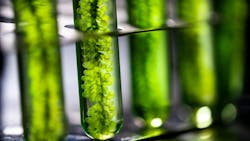Biomanufacturing: The Next Frontier for Chemical Processing?
Three Key Takeaways
- Biomanufacturing offers significant potential for the chemical industry, promising more sustainable production and enhanced supply chain security. However, a major challenge is the lack of piloting facilities needed to scale up innovative products from lab to commercial production.
- Organizations like BioMADE are working to address this challenge by building pilot- to intermediate-scale facilities across the United States. These facilities will allow companies to refine and scale up their chemical processes, test small-volume production, and gain valuable insights before full-scale implementation.
- The U.S. chemical industry is well-positioned to incorporate bioindustrial manufacturing processes, as it already has the necessary raw materials, skilled workforce, and demand for chemical production. By investing in domestic biomanufacturing capabilities now, the industry can avoid the pitfalls experienced by the semiconductor industry and secure a strong position in the growing bioeconomy.
Biomanufacturing holds great promise for the chemical industry. As noted in previous Chemical Processing columns, this approach may offer a path to more sustainable production and enhanced supply chain security. By leveraging domestic crops, chemical manufacturers can expand their bioindustrial capacity, positioning themselves for a greener, more self-reliant future.
A significant challenge hindering chemical manufacturers from fully embracing this movement is a lack of piloting facilities. Biomanufacturing companies often struggle to bring their innovative products from the lab to commercial production. Pilot facilities are essential because they allow manufacturers to refine and scale-up their chemical processes and make small volumes for further product development.
The Scalability Challenge
Collaborative piloting spaces grant companies shared access to high-tech equipment for scaling up production of biobased materials. Players in the space, like Amyris, a synthetic biotechnology and renewable chemical company, are already proving the need for piloting facilities to scale-up innovative technologies that lower production costs.
One common issue in fermentation development is balancing the need for a high final concentration of the desired product to lower costs with the slower rates of product formation. The slower rates are due to product inhibition associated with high product concentrations.
In-situ product removal (ISPR) addresses this inhibition by continuously withdrawing the product from the fermenter during production. Historically, most ISPR research has focused on water-soluble products, but Amyris successfully tested an ISPR process for its oil-soluble products.
For Amyris, the fermentation system with ISPR proceeded without significant inhibition and continued at much higher rates and yields over non-ISPR approaches.
Buoyed by these results, Amyris partnered with philanthropic organization Schmidt Futures and Sudhin BioPharma on the project’s next stage to demonstrate the approach at pilot scale. The company reproduced the lab-scale fermentation performance at the pilot scale.
The pilot phase provided valuable insights to refine the process before scaling up operations. These lessons learned will be crucial for Amyris as the company looks to improve the economic viability of future oil-soluble, microbe-inhibitory products.
The demand for bio-based products with improved functionality and sustainability is why BioMADE, an organization focused on developing biomanufacturing technologies, has launched an effort to build 12–15 pilot- to intermediate-scale facilities across the United States.
BioMADE will build its first pilot facility in Minnesota and has shortlisted six states — California, Georgia, Hawaii, Indiana, Iowa and North Carolina — for consideration as potential sites. But with local partnership and wider industry adoption, this is just the beginning of a thriving biobased chemical pipeline in the United States.
Biobased Manufacturing Considerations
There are many relevant factors when considering a biobased shift in the production of a specific chemical. First, the downstream processing operations for bioindustrial manufactured products must meet the customer’s quality specifications for the application.
Additionally, yields depend upon the metabolic pathways used to make the products. For example, when fermenting sugars, products with higher oxygen content will likely have higher yields. For example, lactic acid, which has a carbon-to-oxygen ratio of 1:1, the same ratio as dextrose, has a theoretical yield of 100%.
A strong candidate for production using bioindustrial manufacturing processes will meet all existing quality specifications while providing economic value to customers. Biobased chemical processing often has advantages in safety because the product is separated from an aqueous solution versus the organic solvents often used in chemical processing.
While the fermenters and some downstream purification-unit operations used in bioindustrial manufacturing may be new technologies for workers, the science and engineering workforce developed for the current U.S. chemicals industry is actually quite similar to the workforce required in a thriving bioindustrial manufacturing ecosystem. Chemical engineers, chemists and microbiologists all have significant roles in the production and product development of bio-based chemicals. Notedly, chemical engineers and chemists will benefit from a general understanding of microbiology and fermentation to build, operate and troubleshoot operations effectively.
Otherwise, the workforce at bioindustrial manufacturing facilities shares many of the same skills as the workforce at traditional chemical production sites in terms of operations management, capital project management and reliability. Therefore, countries, like the United States, that have established chemical industries already have the raw materials, skilled workforce and demand for chemical production to incorporate bioindustrial manufacturing processes and reshore additional well-paying jobs in the national bioeconomic ecosystem.
Learning From the Past
From an industrial movement perspective, the biotech industry of today can learn a lot from the semiconductor industry of 50 years ago. For example, the United States has always driven innovation in semiconductor technology but didn’t invest in scaling the production of microchips. Now, the country relies on legislation, like the CHIPS and Science Act, to revitalize its domestic semiconductor industry.
The biotech industry now finds itself in a similar position to the chips industry in the 1990s. As members of the chemicals industry, we have the power to invest in securing a domestic biomanufacturing pipeline. With ample investment, the industry can leverage its biotech leadership into a game-changing economic boost from bioindustrial manufacturing. We need to learn from the semiconductor industry and continue to grow our investments in the future of the bioeconomy.
About the Author

Jack Starr
Jack Starr is BioMADE’s chief manufacturing officer, where he is driving the development and deployment of a network of between 12 and 15 pilot- to intermediate-scale bioindustrial manufacturing facilities. Starr will oversee site selection, design, construction and operations for the national network. Starr joined BioMADE from Cargill, where his professional expertise centered on process development, piloting and the deployment of advanced solutions for manufacturing. Starr also spent 10 years at NatureWorks, a Cargill joint venture that was a pioneer in biomanufacturing with the development of polylactic acid, a plastic made from renewable resources. This work culminated in building a lactic acid plant that provides the raw materials to NatureWork’s PLA manufacturing facility in Nebraska. He earned his B.S. and Ph.D. degrees in chemical engineering from Iowa State University and the University of California, Berkeley, respectively.
